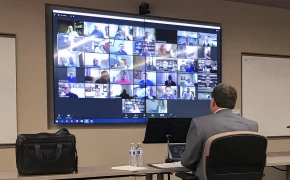TRUSTEES: Gateway returns to pre-COVID 2020-2021 budget

Gateway Seminary’s board of trustees approved a revised budget of $12,000,000 for the 2020-2021 fiscal year during the fall 2020 meeting. Due to stronger than anticipated revenue, trustees approved a return to the original proposed budget developed before the coronavirus pandemic.
Gateway Seminary’s board of trustees approved a revised budget of $12,000,000 for the 2020-2021 fiscal year during the fall 2020 meeting. Due to stronger than anticipated revenue, trustees approved a return to the original proposed budget developed before the coronavirus pandemic. Included in this budget are previously planned salary increases for Gateway faculty and staff.
At the previous meeting in spring, trustees approved a reduced annual budget of $11,500,000 in anticipation of the pandemic. This previous budget assumed a 10 percent reduction in Cooperative Program revenue and a 5 percent decrease in tuition and rental income revenue. Neither of these projections have materialized.
“The seminary is healthy despite all of the external circumstances we are encountering—a global pandemic, social unrest, and economic challenges,” said Jeff Iorg, president of Gateway Seminary.
“Enrollment is exceeding expectations in spite of strict guidelines imposed by the state of California, finances are much stronger than anticipated, and the mission focus and morale remain strong at Gateway.”
Enrolled credit hours in fall 2020 are 6.9 percent greater than fall 2019. Strong financial support for the seminary undergirded enrollment efforts. Donors gave more than $455,000 in scholarship and benevolence funding to support students experiencing difficulties due to the pandemic.
“All we can really say to explain all this is while we worked hard, God blessed us,” Iorg said.
“I salute the seminary—all of the employees and students, who have responded remarkably during the pandemic and have done so much to take us forward in significant ways these past months. But more than that, we celebrate God’s sustaining grace and care for us.”
While the majority of courses are being offered with distance learning format options, face-to-face instruction has resumed at all five campuses. During a typical, pre-COVID semester, one-third of Gateway classes were delivered through distance learning and two-thirds were delivered face-to-face. “During the pandemic, the ratio has flipped,” said Iorg, “and we are prepared to continue our academic program no matter how this fluctuates in the future.”
To offer face-to-face classes, the seminary installed antimicrobial copper films on student desks and plexiglass screens in trafficked work areas. They also developed new cleaning procedures and uniform safety guidelines that are prominently displayed throughout campus buildings.
In other business, trustees approved a bylaw revision to create an investment subcommittee to oversee the seminary’s expanding portfolio. “The business services committee brought this forward because our investments have grown dramatically,” said Gateway trustee David Crosby. “We felt it was prudent as a committee to designate some members to spend more time understanding [our investments], discussing them with people who know investments better than we do, and being diligent in our management responsibility,” he said.
Additionally, trustees approved revisions to standard faculty contracts and arbitration agreements to bring them in accordance with current California law. They also adopted the financial audit report prepared by CapinCrouse. President Iorg announced Dr. Don Dent has agreed to serve as interim director of the Kim School of Global Missions, though he was approved for a sabbatical in the spring 2020 trustee meeting. Dent will be temporarily assuming leadership of the Kim School because of the sudden death of previous director, Dr. Lisa Hoff, on September 21, 2020.
Iorg also reported on a set of questions he is using to prepare the seminary for the future when the pandemic abates.
- What have we stopped doing that does not need to come back?
- What have we started doing that we need to continue in the future?
- How has our internal culture changed? How can we mitigate the negatives and accentuate the positives of those changes?
- How has our community (or mission field or market) changed? How will we adjust our methods accordingly?
“These are important questions for us,” Iorg said.
“We will be asking and answering them as we make academic and budget plans for the next fiscal year, address strategic goals related to the Gateway Imperative, and decide what the best approaches are to future ministry demands.”
--30--
